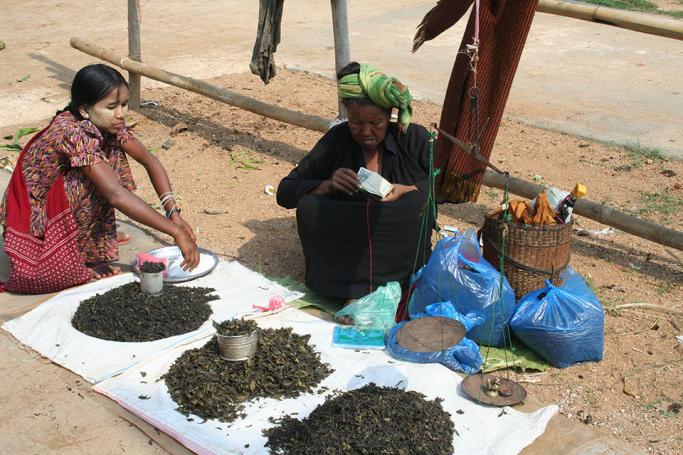Htang Sang, a small Palaung village in Northern Shan State, still endures the ever-present inconvenience caused by ongoing conflicts and muddy roads during the rainy season.
Although it is only 30 kilometres from the trekking attraction Hsipaw, the winding road connecting the hilltop villages and the city becomes abnormally difficult to walk during the rainy season. This is a huge challenge for many tea growers living in the high-altitude villages, most of them ethnic Palaung.
We visited Maung Oo’s house on a hazy morning. His family is relatively wealthy in the village because he was able to see the boom in tourism and offer accommodation and food to the foreign tourists who occasionally visit.
However, Maung Oo said their family still faces many problems.
“Tourism is not our main work, we still want to continue our tea plantation,” Maung Oo’s father said, adding that the tradition of growing tea has been handed down from generation to generation, a hangover from British colonial rule.
“But now the situation has become even worse. Palaung, Shan, and government armies are still fighting each other, and we often hear news of explosions or casualties in this place,” Maung Oo said.
He said that in the past, many tea buyers from Mandalay or other cities came to purchase their tea, but now many purchasers go to other places because of the occasional firefight and poor road conditions.
In addition, with the influx of green tea from China and other countries, many customers began to choose foreign tea because of the nice appearance. “We are eager to get new technology to make our tea become greener instead of brown,” he noted.
In the neighbouring village Pang Hkam, the tea growers have similar concerns.
“Our life is very difficult because of the bad road and the lack of electricity,” a villager said. He added that he was eagerly looking forward to the support of the government.
“Everything depends on a good road. It’s hard to imagine building a new road. We just want to repair it.”
Compared to many Shan villages located at the foot of the mountain, most Palaung villages are in the depths of the mountains.
Because of the lack of a power grid, many families have installed solar energy-saving devices, but in spite of this, their electricity use is still subject to many restrictions. Many of them just use lamps and other small power appliances.
“Now you can see that most tea pickers in the village are women. Many men choose to join the army or go to other cities to find work due to the hard circumstances,” the villager said.
Tea growers in Shan State face a myriad problems. Their prospects for the future to a large extent will depend on a durable peace settlement and efforts to develop the region, not least improving the roads which will allow better trade and an outlet for their age-old tea trade.
You are viewing the old site.
Please update your bookmark to https://eng.mizzima.com.
Mizzima Weekly Magazine Issue...
14 December 2023
Spring Revolution Daily News f...
13 December 2023
New UK Burma sanctions welcome...
13 December 2023
Spring Revolution Daily News f...
12 December 2023
Spring Revolution Daily News f...
11 December 2023
Spring Revolution Daily News f...
08 December 2023
Spring Revolution Daily News f...
07 December 2023
Diaspora journalists increasin...
07 December 2023
US Treasury Secretary emphasizes curbs are 'highly targeted' during China visit












